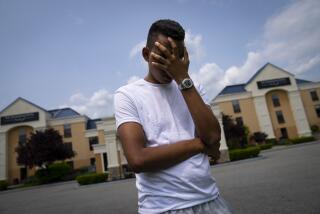Iraqis on 79th Street -- and nobody minds
- Share via
Every block in New York is a universe and every piece of real estate is an empire, especially at the current prices.
Iraq, the ultimate rogue empire, has its sole beachhead in America at 14 E. 79th St., a townhouse that serves as its United Nations mission and picturesquely overlooks the home of the mayor of New York across the street. Mayor Michael Bloomberg, who eschewed Gracie Mansion, is recognized when he walks to the corner diner for Saturday breakfast. But no one in the neighborhood seems to know the Iraqi ambassador, Mohammed Aldouri, the most important Iraqi diplomat outside of Baghdad.
The FBI may be watching the Iraqi diplomats’ every move in New York, but they are largely ignored by the city around them. They may be enemies of the state, but they are not enemies of the block.
In addition to the mayor, the mission shares East 79th Street, just off Central Park, with the archbishop of the Greek Orthodox Church for the Western Hemisphere, at least three classy art galleries, two posh private schools and the Nectar diner. Except when Bloomberg invites George W. Bush to dinner, the block’s biggest headache is cross-town traffic.
Just the other morning, preschool children bundled up against the cold were playing on the stoop of the pariah nation.
The Iraqi security guards, who sat in the mission’s lobby watching soccer on Al Jazeera television, didn’t seem to mind. Indeed, the axis of evil may run right through the mission, but the most threatening thing in the lobby was a vine of ivy wrapping itself around the photograph of a smiling Saddam Hussein in a blue silk suit. Certainly the mothers outside were not the least bit intimidated. They were too busy gossiping and drinking Starbucks.
Without differentiation, New York absorbs them all.
Howard Schott has been observing Iraqi diplomacy on the block for 20 years. He is the principal of the Abraham Lincoln School, which is next door to the mission. The school is part of a movement that introduces practical philosophy in elementary grades. The kindergarten is now studying Sanskrit.
“Our parents are more concerned about how much television their children watch than they are about the Iraqis,” Schott said.
The Iraqi diplomats live quietly in New York when they are not accusing Saddam’s detractors of being spies or defending the despot’s latest global outrage. Lately, the ambassador has been in Baghdad and is expected to return to New York this week to react to a report by U.N. weapons inspectors due on Jan. 27.
But when they are here, Aldouri and the other Iraqis spend most of their workdays in the halls of the U.N., where they are accorded the usual respect. Often they congregate in the delegates’ lounge and perform their most important task -- as a post office, a channel between the U.N. and Baghdad. They attend committee meetings, monitor the oil-for-food program that is part of the U.N. sanctions against them. They also aggressively work the corridors there, sucking in all the intelligence they can. Whenever there is an opportunity, they are on hand to deliver Baghdad’s positions. Sometimes, the Russian ambassador can be seen in the U.N. lounge showing Aldouri a draft of a resolution. But primarily, he is there as the eyes and ears of Saddam.
Westerners at the U.N. view Aldouri as one of Saddam’s petty bureaucrats. He is described as defensive, not smooth-talking like some of his predecessors. His left eye has the tendency to squint when he is talking to the media at microphones set up outside the Security Council chambers.
However, sympathetic diplomats from Islamic countries insist the 61-year-old former law professor can be witty and warm when speaking in Arabic. Still, even they say he is a man constrained, not very talkative and always opaque. “The Iraqis must keep a low profile,” said an Arab diplomat, who asked not to be identified. “They do not want to be caught saying the wrong thing. After all, they do not work for a humane regime.”
The Iraqis at the mission all declined to be interviewed. According to Osama Altayi, an assistant to the ambassador, “This is not a good time for us to get personal.”
What is known about them even among other members of the diplomatic corps is limited. Aldouri apparently works 14-hour days and only appears at diplomatic gatherings with other Islamic or nonaligned countries. He is a regular at the Friday 1 p.m. Muslim prayer service in Secretary General Kofi Annan’s dining room. His wife and children are in Baghdad, and he lives alone in a townhouse around the corner from the mission on East 80th Street. He has servants but once confided to another Middle Easterner that one of his rare pleasures is buying his own groceries in Brooklyn at Arab markets.
Like the other diplomats from pariah states, the Iraqis are not permitted to travel in America beyond New York City’s five boroughs. Some junior diplomats, all of course members of Saddam’s Baath Party, have told friends they don’t like New York -- too much work here, too many people watching them. They complain they are harassed by FBI agents offering them suitcases of cash to defect.
A year ago, there were 16 Iraqi diplomats accredited with the U.N.; now there are about eight. A few people were apparently sent home. Two members of the mission, the No. 2 and the No. 4 diplomats, defected last winter. In June, the United States booted the first secretary in charge of economic affairs at the mission for allegedly trying to recruit American citizens as spies. Accusations like that are traded all the time. This is the life of the mission.
If there is a war, things are likely to continue unchanged. The mission stayed open during the Persian Gulf War in 1990. And unless Saddam is overthrown, the ambassador and his staff are likely to finish out their four-year stints here.
The Iraqis have been on East 79th Street since the 1950s and if they’re anything like Cuban diplomats, who have represented a pariah state in a mission on Lexington Avenue for 40 years and apparently throw the absolute best parties, Iraqis could continue living on East 79th Street for a while.
Anonymity is a sacred right in New York, once called Baghdad-on-the-Hudson by O’Henry for the exotic street life. On the Upper East Side, no one is terribly interested in what goes on inside a townhouse identifiable only by a small gold plaque that reads “The Permanent Delegation of Iraq for the United Nations.”
“Oh, every now and then when things heat up somebody will walk by and scream an obscenity,” said Schott, the principal next door. “But, hey, that’s New York.”
More to Read
Sign up for Essential California
The most important California stories and recommendations in your inbox every morning.
You may occasionally receive promotional content from the Los Angeles Times.













